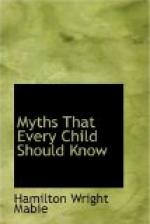“Thief!” he cried. “Freia sends you this as a wedding gift!” And he whirled the hammer about his head, then hurled it once, twice, thrice, as it rebounded to his hand; and in the first stroke, as of lightning, Thrym rolled dead from his throne; in the second stroke perished the whole giant household—these ugly enemies of the AEsir; and in the third stroke the palace itself tumbled together and fell to the ground like a toppling playhouse of blocks.
But Loki and Thor stood safely among the ruins, dressed in their tattered maiden robes, a quaint and curious sight; and Loki, full of mischief now as ever, burst out laughing.
“Oh, Thor! if you could see—” he began; but Thor held up his hammer and shook it gently as he said:
“Look now, Loki: it was an excellent joke, and so far you have done well—after your crafty fashion, which likes me not. But now I have my hammer again, and the joke is done. From you, nor from another, I brook no laughter at my expense. Henceforth we will have no mention of this masquerade, nor of these rags which now I throw away. Do you hear, red laughter?”
And Loki heard, with a look of hate, and stifled his laughter as best he could; for it is not good to laugh at him who holds the hammer.
Not once after that was there mention in Asgard of the time when Thor dressed him as a girl and won his bridal gift from Thrym the giant.
But Mioelnir was safe once more in Asgard, and you and I know how it came there; so someone must have told. I wonder if red Loki whispered the tale to some outsider, after all? Perhaps it may be so, for now he knew how best to make Thor angry; and from that day when Thor forbade his laughing, Loki hated him with the mean little hatred of a mean little soul.
CHAPTER XIV
THE APPLES OF IDUN
Once upon a time Odin, Loki, and Hoener started on a journey. They had often travelled together before on all sorts of errands, for they had a great many things to look after, and more than once they had fallen into trouble through the prying, meddlesome, malicious spirit of Loke, who was never so happy as when he was doing wrong. When the gods went on a journey they travelled fast and hard, for they were strong, active spirits who loved nothing so much as hard work, hard blows, storm, peril, and struggle. There were no roads through the country over which they made their way, only high mountains to be climbed by rocky paths, deep valleys into which the sun hardly looked during half the year, and swift-rushing streams, cold as ice, and treacherous to the surest foot and the strongest arm. Not a bird flew through the air, not an animal sprang through the trees. It was as still as a desert. The gods walked on and on, getting more tired and hungry at every step. The sun was sinking low over the steep, pine-crested mountains, and the travellers had neither breakfasted nor dined. Even Odin was beginning to feel the pangs of hunger, like the most ordinary mortal, when suddenly, entering a little valley, the famished gods came upon a herd of cattle. It was the work of a minute to kill a great ox and to have the carcass swinging in a huge pot over a roaring fire.




